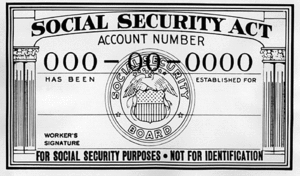How Identity Theft Occurs
Identity theft occurs when someone uses your personally identifying information, like your name, Social Security number, or credit card number, without your permission, to commit fraud or other crimes.
Identity theft is a problem that affects 5 people out of a hundred people. In
the United States, that's 11.7 MILLION people, which to me makes it a
serious problem.

Image via Wikipedia
If you aren't pro-actively protecting yourself by doing simple things like reading over your monthly credit card statements (to verify the expenditures), emptying your mailbox every day (to prevent theft of checks and credit cards), and shredding -- before trashing -- your bank statements (and any other documents that have your personal financial information on them), you could be the next victim.
How do thieves steal an identity?
Identity theft starts with the misuse of your personally identifying information such as your name and Social Security number, credit card numbers, or other financial account information. For identity thieves, this information is as good as gold.
Skilled identity thieves may use a variety of methods to get hold of your information, including:
- Dumpster Diving. They rummage through trash looking for bills or other paper with your personal information on it.
- Skimming. They steal credit/debit card numbers by using a special storage device when processing your card.
- Phishing. They pretend to be financial institutions or companies and send spam or pop-up messages to get you to reveal your personal information.
- Changing Your Address. They divert your billing statements to another location by completing a change of address form.
- Old-Fashioned Stealing. They steal wallets and purses; mail, including bank and credit card statements; pre-approved credit offers; and new checks or tax information. They steal personnel records, or bribe employees who have access.
- Pretexting. They use false pretenses to obtain your personal information from financial institutions, telephone companies, and other sources.
What do thieves do with a stolen identity?
They often sell it to multiple thieves. Once they have your personal information, identity thieves use it in a variety of ways.
Credit card fraud:
- They may open new credit card accounts in your name. When they use the cards and don't pay the bills, the delinquent accounts appear on your credit report.
- They may change the billing address on your credit card so that you no longer receive bills, and then run up charges on your account. Because your bills are now sent to a different address, it may be some time before you realize there's a problem.
Phone or utilities fraud:
- They may open a new phone or wireless account in your name, or run up charges on your existing account.
- They may use your name to get utility services like electricity, heating, or cable TV.
- They may create counterfeit checks using your name or account number.
- They may open a bank account in your name and write bad checks.
- They may clone your ATM or debit card and make electronic withdrawals your name, draining your accounts.
- They may take out a loan in your name.
Government documents fraud:
- They may get a driver's license or official ID card issued in your name but with their picture.
- They may use your name and Social Security number to get government benefits.
- They may file a fraudulent tax return using your information.
Other fraud:
- They may get a job using your Social Security number.
- They may rent a house or get medical services using your name.
- They may give your personal information to police during an arrest. If they don't show up for their court date, a warrant for arrest is issued in your name.
What can you do to help fight identity theft?
Awareness is an effective weapon against many forms identity theft. Be informed and aware of how information is stolen and what you can do to protect yours. Stay up to date on the latest scams, monitor your personal information to uncover any problems quickly, and know what to do when you suspect your identity has been stolen. Have a plan of action!
Your time, energy and name are valuable to you-and thieves.
Think Fraud! If not now, when?
See:


 NEWSLETTER SIGN UP
NEWSLETTER SIGN UP SUBSCRIBE
SUBSCRIBE CONTACT
CONTACT
















